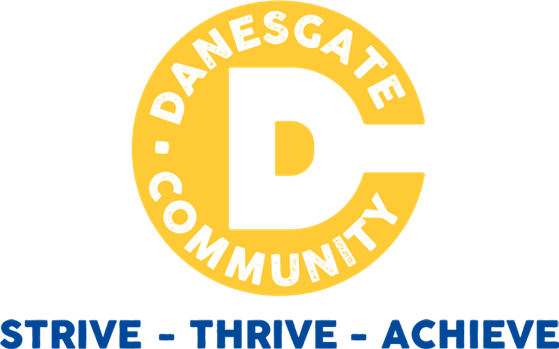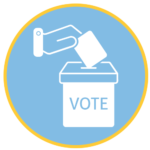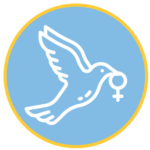Examples of how fundamental British values, including democracy, the rule of law, individual liberty, and mutual respect and tolerance of those with different faiths and beliefs, have been actively promoted across Danesgate Community include:
- Danesgate Values and Key Learning Attributes
- Weekly assemblies led by Senior team
- Student Voice activities
- Student Councils
- Several curriculum areas, in particular PSHE and Expressive Arts curriculum
- Form activities
- After school and all enrichment activities
- Charity work
- Homophobic Bullying campaign
- Good manners campaign
- Sporting events
- Frequent visiting Educational Theatre workshops.
- Links with the local and wider community through visiting speakers
- Educational trips and visits and other opportunities for learning outside the classroom
Our approach to SMSC is embedded in our ethos of mutual respect, partnership working and collaboration; an approach that we believe is fundamental to a full and positive participation in life in modern Britain.
We support the spiritual development of our pupils to enable them to develop their:
- ability to be reflective about their own beliefs, religious or otherwise, that inform their perspective on life and their interest in and respect for different people’s faiths, feelings and values;
- sense of enjoyment and fascination in learning about themselves, others and the world around them;
- use of imagination and creativity in their learning; and
- willingness to reflect on their experiences.
We support the moral development of our pupils to enable them to develop their:
- ability to recognise the difference between right and wrong, and to apply this understanding in their own lives and, in so doing, respect the civil and criminal law of the UK;
- understanding of the consequences of their behaviour and actions; and
- interest in investigating and offering reasoned views about moral and ethical issues, and being able to understand and appreciate the viewpoints of others on these issues.
We support the social development of our pupils to enable them to develop their:
- use of a range of social skills in different contexts, including working and socialising with pupils from different socio economic backgrounds.
- willingness to participate in a variety of communities and social settings, cooperating well with others and being able to resolve conflicts effectively;
- acceptance and engagement with the fundamental British values of democracy, the rule of law, individual liberty and mutual respect and tolerance of those with different faiths and beliefs.
We support the cultural development of our pupils to enable them to develop their :
- understanding and appreciation of the wide range of cultural influences that have shaped their own heritage and that of others;
- understanding and appreciation of the range of different cultures within school and further afield as an essential element of their preparation for life in modern Britain;
- knowledge of Britain’s democratic parliamentary system and its central role in shaping our history and values, and in continuing to develop Britain;
- willingness to participate in and respond positively to artistic, sporting and cultural opportunities;
- interest in exploring, improving understanding of and showing respect for different faiths and cultural diversity,
- tolerance towards different religious, ethnic and socio-economic groups in the local, national and global communities.
Through the range of activities offered we aim to enable our pupils to develop their:
- self-knowledge, self-esteem and self-confidence;
- their acceptance of responsibility for their behaviour;
- their understanding of how they can contribute positively to the lives of those living and working in the locality in with the school is situated and to society more widely;
- respect for their own and other cultures;
- respect for other people, with particular regard to the protected characteristics set out in the Equality Act 2010; and
- respect for democracy and support for participation in the democratic process.
These are the skills and attitudes we believe will allow our pupils to participate fully in and contribute positively to life in modern Britain. The following document shows some of the ways in which we deliver and embed these values through and beyond the curriculum.
https://danesgatecommunity.org.uk/wp-content/uploads/2024/02/British-Values-Mapping.pdf
Why is RSE important?
Relationships, Sex and Health Educations is fully embedded in our curriculum at all levels and key stages, and as such the delivery is carefully mapped across a range of mediums to ensure outstanding provision that supports the development of confident, healthy, happy children who are equipped to make a positive contribution to the community. This includes taught lessons, 1on1 lessons, small group and specialist externally delivered workshops. Parent voice and feedback as well as student voice has been sought and informs the development of this curriculum for 2023-24 and will continue to guide our provision each year.
High quality RSE helps create safe school communities in which students can grow, learn, and develop positive, healthy behaviour for life, and for the following reasons:
RSE plays a vital part in schools fulfilling their statutory duties to protect and safeguard their students. Ofsted is clear that schools must have a preventative programme that enables students to learn about safety and risks in relationships.
Schools maintain a statutory obligation under the Children Act (2004) to promote their students’ wellbeing and under the Education Act (2002) to prepare children and young people for the challenges, opportunities and responsibilities of adult life. A comprehensive RSE programme can have a positive impact on students’ health and wellbeing and their ability to achieve, and can play a crucial part in meeting these obligations.
Technology is evolving at a tremendous pace. The need to protect children and young people from inappropriate online content, cyber-bullying and exploitation is a growing concern. A comprehensive RSE programme can support in addressing these issues.
Documents and Links
RSE Survey
Our priorities for Relationship, Sex and Health Education
Our approach to Relationships, Sex and Health Education is underpinned by our commitment to ensuring that every child has the opportunity to STRIVE, THRIVE and ACHIEVE. As such our curriculum is further underpinned by the our commitment to treating every child as an individual and providing an education that is unique to meet their own specific needs.. We want to help develop confident, healthy, happy students who can make a positive contribution and are confident expressing their views and challenging discrimination in all its forms.
Useful links
Citizenship education develops knowledge, skills and understanding that pupils need to play a full part in democratic society, as active and informed citizens. Pupils are taught about democracy, politics, parliament and voting. Additionally they learn about human rights, justice, the law, identies and diversity. Topics such as media and information literacy, climate change and sustainability, financial and economic education and the role of the UK in the wider world are also included.
We follow the national Curriculum, but provide a bespoke provision to meet the needs of our students.
Key Stage 1
During key stage 1 pupils learn about themselves as developing individuals and as members of their
communities, building on their own experiences and on the early learning goals for personal, social
and emotional development.
They learn the basic rules and skills for keeping themselves healthy and safe and for behaving well.
They have opportunities to show they can take some responsibility for themselves and their
environment. They begin to learn about their own and other people’s feelings and become aware of
the views, needs and rights of other children and older people.
As members of a class and school community, they learn social skills such as how to share, take
turns, play, help others, resolve simple arguments and resist bullying. They begin to take an active
part in the life of their school and its neighbourhood.
Key Stage 2
During key stage 2 pupils learn about themselves as growing and changing individuals with their
own experiences and ideas, and as members of their communities.
They become more mature, independent and self-confident. They learn about the wider world and
the interdependence of communities within it. They develop their sense of social justice and moral
responsibility and begin to understand that their own choices and behaviour can affect local,
national or global issues and political and social institutions. They learn how to take part more fully
in school and community activities.
As they begin to develop into young adults, they face the changes of puberty and transfer to
secondary school with support and encouragement from their school. They learn how to make more
confident and informed choices about their health and environment; to take more responsibility,
individually and as a group, for their own learning; and to resist bullying.
Key stage 3
During Key stage 3 we develop pupils’ understanding of democracy, government and the rights and responsibilities of citizens. Pupils should use and apply their knowledge and understanding whilst developing skills to research and interrogate evidence, debate and evaluate viewpoints, present reasoned arguments and take informed action.
Key stage 4
During Key stage 4 we build on the key stage 3 programme of study to deepen pupils’
understanding of democracy, government and the rights and responsibilities of citizens.
Pupils should develop their skills to be able to use a range of research strategies, weigh
up evidence, make persuasive arguments and substantiate their conclusions. They should
experience and evaluate different ways that citizens can act together to solve problems
and contribute to society.
For all of our pupils we explicit in the teaching of behaviours that support their learning and provide them with the skills that allow them to Thrive and Achieve in later life.








